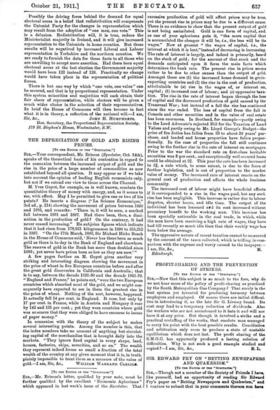[To THE EDITOR OF THE "SFECTAI0R. "]
Sin,—Mr. Briscoe's letter, qualified by your note, must be further qualified by the excellent "Economic Aphorisms " which appeared in last week's issue of the Spectator. That excessive production of gold will affect prices may be true, yet the present rise in prices may be due to a different cause. There is no evidence to show that the present output of gold is not being assimilated. Gold is one form of capital, and. as one of your aphorisms puts it, "the more capital that is accumulated the cheaper it will be, i.e., the less will be its wages." Now at present " the wages of capital, i.e., the interest at which it is lent,"instead of decreasing is increasing. The rate of interest is largely, and indeed is primarily, based on the stock of gold ; for the amount of that stock and the demands anticipated upon it form the main facts which determines the bank rate. The present rise in prices seems rather to be due to other causes than the output of gold. Amongst these are (1) the increased home demand in grain- exporting countries and (2) the rise in the coat of production, attributable to (a) rise in the wages of, or interest on, capital ; (b) increased cost of labour; and (c) oppressive taxa- tion. The rise in the rate of interest began through the loss of capital and the decreased production of gold caused by the Transvaal War ; but instead of a fall the rise has continued since the war ended. The loss of capital from the fall in Consols and other securities and in the value of real estate has been enormous. In Scotland, for example—partly owing to the Lord Advocate's rejected Biil for the Taxation of Land Values and partly owing to Mr. Lloyd George's Budget—the price of feu duties has fallen from 33 to about 20 years' pur- chase, and landed and house properties have fallen propor- tionally. In the case of properties the fall still continues owing to the further rise in the rate of interest on mortgages. Prior to the war the standard rate on first-class heritable securities was 3 per cent., and exceptionally well-secured loans could be obtained at 2i. This year the rate has been increased to 3f, a rate which, to some extent, is due to the fears of further legislation, and is out of proportion to the market value of money. The increased rate of interest reacts on the general cost of production and affects the whole business community.
The increased cost of labour might have beneficial effects if it corresponded to a rise in the wages paid, but any such rise has been negligible. This increase is rather due to labour disputes, shorter hours, and idle time. The output of the individual has been lessened aid its cost increased without pecuniary benefit to the working man. I his increase has been specially noticeable in the coal trade, in which, while the men have been receiving a high rate of wages, they have had till recently so much idle time that their weekly wage has been below the average.
The oppressive nature of recent taxation cannot be measured by the amount of the taxes collected, which is trifling in com- parison with the expense and worry caused to the taxpayer.—














































 Previous page
Previous page